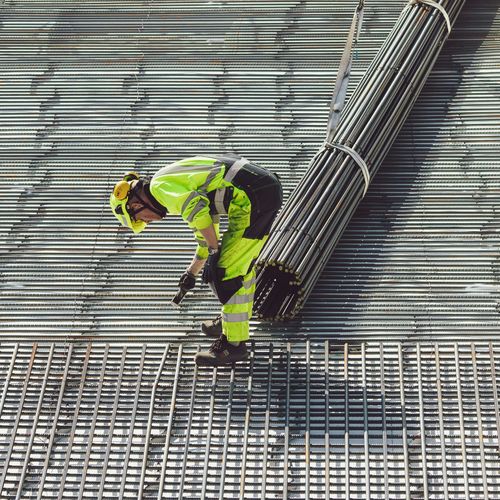With over 2 million workers employed across 289,000 companies, the UK’s construction industry is a vital sector of the economy. However, building sites also pose serious safety risks that can be exacerbated by drug and alcohol use. This article examines the growing calls for comprehensive drug testing programmes to cover all UK construction workers.
The High Rate of Injuries in Construction
Working in construction is inherently hazardous. The combination of working at height, heavy machinery, dust, noise, and lifting heavy loads makes it one of Britain’s most dangerous industries.
- Construction has the second highest rate of non-fatal injuries after agriculture, with over 100,000 injuries occurring annually.
- It also has one of the highest rates of workplace fatalities, with falls from height, electric shocks, and traffic accidents leading to over 30 construction worker deaths per year.
These alarming statistics demonstrate why safety must be the top priority across UK building sites. Even a small lapse in judgement can have catastrophic consequences when working around towering scaffolding or deafening machinery.
Drug and Alcohol Use Exacerbates Existing Risks
The unsafe nature of construction sites means employees must be fully alert and capable of quick reactions. However, studies indicate drug and alcohol abuse may be more common in the industry than many realise:
- Over a third of construction workers report having witnessed colleagues working while under the influence of drugs or alcohol.
- Almost two thirds say they have never actually been tested themselves on site.
- Stories abound of workers using stimulants like cocaine to meet punishing project deadlines.
This prevalence of drug and alcohol use only increases the risks construction workers face. Intoxication leads to impaired judgement, delayed response times, and correct use of machinery – endangering both the user and their co-workers.
Poor mental health may also be spurring on substance abuse. Over 350,000 construction workers are estimated to be facing mental health issues currently. In the absence of other coping mechanisms, some turn to drugs or alcohol to handle the stress.
Calls for Consistent, Nationwide Drug Testing
Unlike comparable industries like oil & gas and rail, the UK construction sector currently lacks clear legislation around drug and alcohol testing. While some large construction firms have voluntarily implemented testing programmes, there are no industry-wide standards.
According to studies:
- Only around 35% of construction workers report ever being drug tested on site
- Almost 60% express concern over the lack of regulation of drug and alcohol usage
Industry bodies have created testing guidelines, but these voluntary codes cannot properly regulate the vast, fragmented construction workforce. Construction urgently requires nationwide statutory drug testing akin to the system covering rail workers.
What Drug Testing Methods Are Used?
The most common types of drug tests used by construction firms today are:
- Urine tests: The current benchmark for workplace testing due to being easy to administer and providing quick results. Can detect a range of illegal and prescription drugs.
- Saliva tests: Increased in popularity in recent years as they are easy to use and less invasive than urine tests. Offer fast results.
- Hair testing: The least common method but can detect drug use stretching back months rather than days. May be used for pre-employment screening.
Breath alcohol tests are also often used for screening for alcohol intoxication on site. Testing methods that are minimally invasive and provide rapid results are preferred for the busy construction environment.
The Case for Regulated Testing Programmes
Proper oversight and legislation mandating drug and alcohol testing would offer many benefits:
- Sends a clear message that intoxication will not be tolerated on worksites where lives are at risk
- Provides consistency across all construction firms rather than relying on voluntary policies
- Allows firms to reliably detect drug and alcohol abuse, removing unsafe workers from site
- Ensures those with substance abuse problems can be identified and directed into support programmes rather than simply fired
- Research shows testing programmes can positively impact safety when combined with rehabilitation
Many advocate adopting pre-employment, random and “for cause” drug testing modelled on successful programmes in transport industries. Workers in safety-critical construction roles would face regular checks to detect drug use and emerging problems.
Testing Must Be Part of a Larger Safety Initiative
It is important to note that drug testing alone will not eliminate construction’s risky work culture. It must form part of a larger focus on workforce health and safety. Other key actions include:
- Improved training to ingrain a culture of safety from day one
- Ensuring proper safety equipment and oversight is in place across sites
- Tackling the long working hours and pressure that may encourage drug use
- Providing mental health support to address underlying issues leading workers to self-medicate
Like any workplace health initiative, testing should focus on rehabilitation rather than solely punishment. The end goal must be supporting workers so they can thrive in a safer, more responsible industry.
Conclusion
The persistent high rates of injury and fatality make a compelling case for strong, legislated oversight of drug and alcohol use in UK construction. Stakeholders increasingly agree proper nationwide drug testing programmes could improve safety and help those needing support.
Workers have a right to a sober, risk-free worksite. Regulated testing across the sector is an overdue measure that would benefit construction businesses and their employees alike. The industry should advocate for coherent testing policies to be implemented as part of its duty of care to Britain’s builders.
Photo by Mads Eneqvist on Unsplash
Zoom Testing is a leading UK drug testing company and a supplier of Drug Test Kits.





